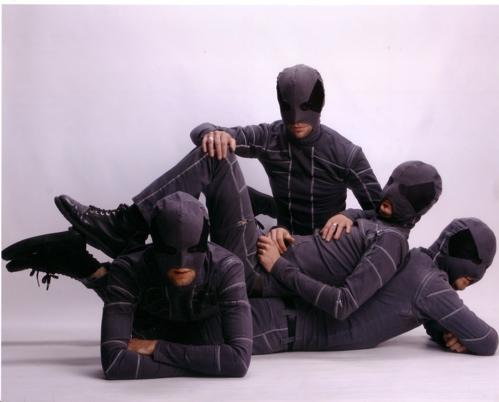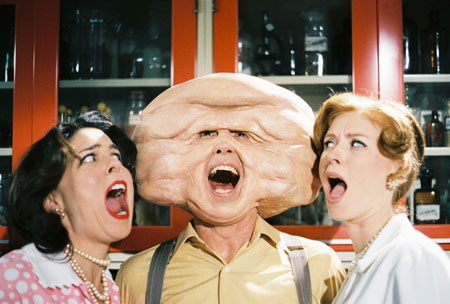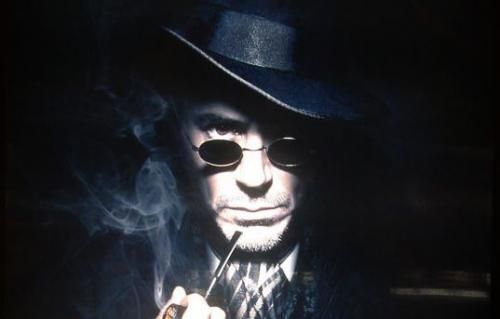
When you catch the right riff, it's exhilarating. When I do, I remember little of what I say -- a pre-written line and I'm off, riding the room's energy. It's a vibrant, peaceful sensation that ends much too quickly. As I move on to longer sets, I'll see how far I can take it. But for now it's brief bursts to that clean edge and back. And yes, inner-circle, I plan to start taping them.
I especially feel this at the Village Lantern, an inmate-run dump of a space where anything goes and usually does. This is without doubt Ray Combs' room. There are other Lantern emcees, but Ray's mics inspire comic anarchy unlike anything I've seen. The tiny place is packed when Ray hosts, and he doesn't disappoint, unless you have thin skin or are unsure of your talent. Then you might be in trouble. But even here, Ray will help you help yourself. You need only let go and body surf those waves.
Before the show, I apologized to Ray for not delivering a boffo-laffo set for his friends at the hostel. Ray blew it off. There was nothing to feel badly about, he insisted, though he did relay what his friends said about my set. The emcee's partner, who was extremely nice to me after that show, thought my stuff was too UCB for his room. Fair enough. The emcee, however, was pissed about my set, thinking that I didn't care that I bombed on his stage. Ray didn't believe this, and shouldn't, since it's not the case.
I knew about a minute into my set that I was wrong for the room. My energy and material were diametrically opposed to the prevailing tone. It happens. That I didn't start flailing about, seeking any cheap laugh to "save" my set is what irked the emcee. I went off book, commenting on the audience's silence, but not in an inorganic way. If my act was insult/baiting-based, then yeah, I'd probably crank up the abuse. However, I'm working toward something else. There are bound to be quiet, confused, unamused crowds along the way. This was one.
Not only did I care about that set, I learned a valuable lesson about trusting the riff. So I saw it as a positive experience. Afterward, I stuck around to talk to him, since his displeasure was evident. But he avoided me, wouldn't look me in the eye, focused all his attention on another (and very bright) comic. His partner was more polite and curious, asking if the story about the Muslims was true. "Pretty much," I replied. "Of course, I was tripping at the time." Finally, I gave up trying to engage the emcee, and walked with the other comic back to the Village, having a nice chat about influences and approaches.
The Lantern's basement was a different story. Comic after comic flirted with, pushed against, and dove into the room's semi-controlled chaos. One English comic was upset with Ray over a joke about her delivery, and she spent her time interrogating Ray who was off-stage. When she finished, Ray took the mic and apologized. He wasn't serious about his jibe, but it clearly cut the delicate comic. Then Ray announced that as contrition, he would go back to a nicer period of comedy, circa 1986.
"Ladies and gentlemen, the Improv is proud to bring up this next comic, who's working on a screenplay called Pizza Man for another up-and-comer, Bill Maher -- give it up for Dennis Perrin!"
I rolled with Ray's premise. "Thank you! Give a hand to Ray Combs Sr.! Expect big things from him very soon! He's gonna be around a long time!"
Ray laughed, as did the other comics, however cautiously. Apart from Ray, I haven't seen another comedian make fun of his Dad. And to be fair, Ray doesn't really mock his old man, but is clearly working through complex emotions about his father's career, private meltdown, and suicide. My feelings about Ray Sr. are also mixed, though mostly positive, as he did much to feed my young ambition. So I guess I'm allowed to make Dead Ray jokes as well.
I improvised a brief 1986 set, mentioning Reagan, Iran/contra, Leno, and Howie Mandel, whose future I predicted amid Mandel's old screaming "What? What?" routine. Then I snapped back to 2010 and said, "The beautiful thing about getting fucked in the ass is that you can't fake a reaction. It's perhaps the most honest form of human communication." From there I riffed about how anal sex explains contemporary power relationships, referring to gays in the military, corporate rape, and the recently-exposed video of US servicemen massacring Iraqis from the air. I don't recall the exact wording, since I only wrote the opening lines, but it flowed and felt great. The room responded favorably, and I ended with a word about love, quoting and crediting O'Donoghue: "Love is a death camp in a costume." Good night!
Later, up in the bar, I had friendly conversations with a few younger comics, buying them a round of pints. Then I ran into Ray's emcee friend who showed up for the mic, shaking his hand, smiling. Ray joined us and acted as facilitator, trying to smooth out whatever differences existed. There were none on my end, though I did say I didn't appreciate his cold shoulder after my set. If he had any problems with me, I was right there to hear them. Clearly, direct critical engagement is tough for this guy. But in the end, none of it mattered. If he doesn't want to book me in his rooms, fine. There are plenty of other stages. I'm not for everyone, nor am I trying to be.
The Project is not about comedy feuds, rivalries, or career envy. There's a larger purpose here. What it is precisely I still cannot say. That's being worked through, stage by stage. But it's already generating positive reactions, which is inspiring. It's a labor of love, liberated from its costumed death camp.
NEXT: Laughter and nothingness.















